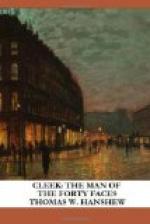“I couldn’t let the butler show you out, Mr. Cleek,” she said, as they stood together in the wide entrance hall. “I couldn’t let you go until I had said something that is on my mind—something that has been pricking my conscience all evening. I want to tell you that from this night on I am going to forget those other nights: that one in the mist at Hampstead, that other on the stairway at Wyvern House—forget them utterly and entirely, Mr. Cleek. Whatever you may have been once, I know that now you are indeed a man!”
Then gave him her hand again, smiled at him, and sent him home feeling that he was as near to the threshold of heaven as any mortal thing may hope to be.
Followed a time of such happiness as only they may know who having lived in darkness first know that there is such a thing as Light; followed days and weeks that went like magic things, blest to the uttermost before they go. For now he was a welcome visitor at the house that sheltered her; now the armour of reserve had dropped from her, and they were finding out between them that they had many tastes in common.
It was in August when the first interruption to this happy state of affairs occurred and they came to know that separation was to be endured again. Lady Chepstow, planning already for a wedding that was to take place in the early winter, decided to spend the last few months of her widowhood at her country house in Devonshire, and retired to it taking her servants, her little son, and her son’s governess with her.
For a day or two, Cleek “mooned” about—restless, lonely despite Dollops’s presence, finding no savour in anything; and it came as a positive relief when a call from The Yard sent him to a modest little house in the neighbourhood of Wandsworth Common. The “call” in question took the shape of a letter from Mr. Narkom.
“My dear Cleek,” it ran, “a most amazing case—probably the most amazing you have yet tackled—has just cropped up. The client is one Captain Morrison, a retired Army officer living solely on his half pay. His daughter is involved in the astonishing affair. Indeed, it is at her earnest appeal that the matter has been brought to my notice. As the Captain is in too weak a state of health to journey any distance, I am going to ask you to meet me at No. 17, Sunnington Crescent, Wandsworth—a house kept by one Mrs. Culpin, widow of one of my Yard men, at three o’clock this afternoon. Knowing your reluctance to have your identity disclosed, I have taken the liberty of giving you the name you adopted in the Bawdrey affair, to wit: ‘George Headland.’ I have also taken the same precaution with regard to the Morrisons, leaving you to disclose your identity or not, as you see fit.”
Glad enough for anything to distract his thoughts from the brooding state of melancholy into which they had sunk, Cleek looked up a time-table, caught the 2:47 train from Victoria Station; and Narkom, walking into Mrs. Culpin’s modest little drawing-room at two minutes past three, found him standing in the window and looking thoughtfully out at the groups of children romping on the near-by common.




